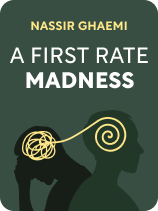

This article is an excerpt from the Shortform book guide to "A First Rate Madness" by Nassir Ghaemi. Shortform has the world's best summaries and analyses of books you should be reading.
Like this article? Sign up for a free trial here.
What is depressive realism? Why do depressed leaders have a more realistic perception than mentally healthy ones?
Depressive realism is a theory that people who are depressed make better decisions because they have a more realistic view of the world. A First-Rate Madness by Nassir Ghaemi expands on this philosophy by showing how Winston Churchill’s depression helped him during World War II.
Here’s how depressive realism works, and how it affected Churchill’s understanding of the Nazi threat.
Depression Gives You a Realistic Perspective
In Ghaemi’s eyes, leaders who either suffer from depression or have dysthymic personalities have depressive realism: they are better at realistically assessing critical situations, while mentally healthy leaders are too optimistic. To illustrate this, Ghaemi points to experiments showing that mentally healthy people tend to overestimate how much control they have over situations—for example, they overestimate their ability to predict the results of coin tosses or to control random events.
This phenomenon is called an “illusion of control.” The experiments Ghaemi discusses showed that people with depression have a more realistic perception of control over their environment, more accurately judging their ability to predict chance events or to influence those events.
(Shortform note: The illusion of control is what’s known as a positive illusion, which is an unrealistically pleasant belief we hold to maintain our psychological well-being and happiness. When we have these to a mild degree, they make us happier. For example, when we believe we’re more capable than others or that we deserve good things, we can better overcome the stresses in our lives. It’s when positive illusions lead us to adopt unrealistic beliefs—like that we can predict coin tosses or influence randomness—that they can lead us to make poor decisions.)
Ghaemi contends that, for leaders, this illusion of control can develop into the hubris syndrome, a term coined by David Owen, who argued that people in power become increasingly overconfident in their beliefs and abilities and refuse to adapt to changing circumstances. This stubborn optimism can cause leaders to make wrong decisions when managing sensitive situations
(Shortform note: David Owen defines hubris as overconfidence and pridefulness, arguing that hubris turns into a syndrome the longer someone holds power with little restraint. Several characteristics of this syndrome include being overly concerned with appearance, having the tendency to use the third person or plural “we” pronoun, and prioritizing a vision over potential costs or outcomes. After studying leaders of the past century, Owen determined that Winston Churchill and Franklin D. Roosevelt didn’t have hubris syndrome while Neville Chamberlain, Tony Blair, and George W. Bush did. These conclusions align with Ghaemi’s in that the leaders Ghaemi claims had mental illness did not display symptoms of hubris, while the others did.)
Example: Winston Churchill and the Nazi Threat
According to Ghaemi, Winston Churchill’s depressive episodes allowed him to realistically determine the severity of the Nazi threat long before the onset of World War II. Based on his research, Ghaemi concludes that Churchill had manic-depressive tendencies. He suffered from severe depressive episodes throughout his life, even calling his depression his “Black Dog.”
According to Ghaemi, these depressive episodes gave Churchill clarity and allowed him to understand that Adolf Hitler posed a serious threat and that a world war was looming. In the years leading up to the war, while most of England, including then-Prime Minister Neville Chamberlain, favored negotiating with and appeasing Hitler, Churchill called for decisive action to quell what he recognized as a unique threat that couldn’t be dealt with through typical diplomacy.
(Shortform note: Many historians agree with Ghaemi that Churchill had remarkable foresight regarding the Nazi threat. However, they add that his leadership prowess came not from his realism alone, but from the fact that he could effectively communicate his realistic assessments to the British people. In his speeches, Churchill would first paint an honest picture of the threat. Then, he would provide a rational reason for optimism. This ability to communicate his realism while simultaneously promoting optimism fostered both trust and confidence in the public.)

———End of Preview———
Like what you just read? Read the rest of the world's best book summary and analysis of Nassir Ghaemi's "A First Rate Madness" at Shortform.
Here's what you'll find in our full A First Rate Madness summary:
- How mental illness can make someone a better leader
- How leaders like Churchill and Roosevelt benefited from mental illness
- The pitfalls of being a mentally well leader during a time of crisis






